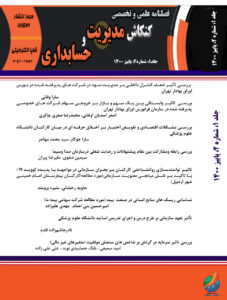مقاله: پژوهشی
صفحه: 285- 307
نویسندگان:
سعید احمدی باویل[1]
[1] گروه کارآفرینی فناورانه، دانشکده کارآفرینی، دانشگاه تهران، تهران، ایران. (Saeid.ah.ph@gmail.com)
چکیده
سرمایه اجتماعی به افراد اجازه میدهد که مشکلات مشترک را خیلی آسانتر حل کنند و افـراد، اغلـب زمـانی کـه بـا هـم همکـاری می کنند و نسبت به زمانیکه هرکس به تنهایی کار خودش را انجام مـی دهـد، آسـوده خـاطرتر هسـتند. پژوهش حاضر، به بررسی تاثیر سرمایه اجتماعی بر کار افرینی با نقش میانجی تسهیم دانش در سازمان مخابرات استان تهران می پردازد. از نوع توصیفی-همبستگی بوده و جامعه آماری آن شامل 200 نفر از کارمندان سازمان مخابرات این استان، در سال 1403 است. حجم نمونه آماری پژوهش با استفاده از جدول کرجسی و مورگان، 132 نفر محاسبه شد و از روش نمونه گیری تصادفی ساده برای انتخاب نمونه استفاده شده است. ابزار اندازه گیری شامل سه پرسشنامه؛ سنجش سرمایه اجتماعی از پرسشنامه استاندارد بر اساس اوزجان و همکاران(2022)، و برای سنجش تسهیم دانش از پرسشنامه استاندارد ال تیت و همکاران(2022) و در نهایت پرسشنامه کارآفرینی بر گرفته از پرسشنامه محقق ساخته والکر و همکاران(2004) بود. مقادیر آلفای کرونباخ برای همه متغیرها بالای 7/0 بود که نشان از پایایی متناسب متغیرها بود. برای تجزیه و تحلیل داده ها از نرم افزار SPSS26 و برای مدل سازی معادلات ساختاری و تحلیل مسیر از نرم افزار 3 Smart PLS استفاده شد. تجزیه و تحلیل نتایج نشان داد که متغیر تسهیم دانش به عنوان یک متغیر میانجی تاثیر مستقیم و معناداری بر سرمایه اجتماعی و کار افرینی ندارد. علاوه بر این تاثیر سرمایه اجتماعی بر کارآفرینی تاثیر تسهیم دانش بر کارآفرینی رد شد. نتایج نیز نشان داد که سرمایه اجتماعی بر تسهیم دانش تاثیر مثبت و معناداری دارد.
کلمات کلیدی:
سرمایه اجتماعی، کارآفرینی، تسهیم دانش.
Saeed Ahmadi Bawil[1]
[1] Department of Technological Entrepreneurship, Faculty of Entrepreneurship, University of Tehran, Tehran, Iran. (Saeid.ah.ph@gmail.com)
abstract
Social capital allows people to solve common problems much more easily, and people are often more relaxed when they work together than when everyone is doing their own thing alone. The present study examines the impact of social capital on creative work with the mediating role of knowledge sharing in the telecommunications organization of Tehran province. It is a descriptive-correlation type and its statistical population includes 200 employees of the telecommunications organization of this province in 1403.The statistical sample size of the research was calculated using the Karjesi and Morgan table, 132 people, and the simple random sampling method was used to select the sample. The measurement tool includes three questionnaires; The measurement of social capital was based on the standard questionnaire based on Ozjan et al. (2022), and for the measurement of knowledge sharing, it was based on the standard questionnaire of L. Tate et al. Cronbach’s alpha values for all variables were above 0.7, which indicated proportional reliability of variables. SPSS26 software was used for data analysis and Smart PLS 3 software was used for structural equation modeling and path analysis. The analysis of the results showed that the variable of knowledge sharing as a mediating variable does not have a direct and significant effect on social capital and entrepreneurship. In addition, the effect of social capital on entrepreneurship, the effect of knowledge sharing on entrepreneurship was rejected. The results also showed that social capital has a positive and significant effect on knowledge sharing.
Keywords:
Social capital, entrepreneurship, knowledge sharing.
